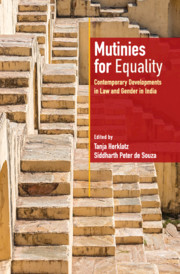1 - Family Matters, Gender Matters: Courts on the Rule against Restraints on Alienation
Published online by Cambridge University Press: 08 June 2021
Summary
Introduction
On the subject of gender inequality in property ownership, while family laws are regularly subject to feminist critique, the implications of laws that govern market transactions are often overlooked. In this chapter, I turn the feminist lens onto the general rules on the transfer of property in India, and study its impact on the distribution of resources within the household. I focus on a specific principle of property law, the rule against restraints on alienation, and examine the judicial practice in the context of transfers within the family, particularly where the transferee is a woman. While the principle itself is couched in gender-neutral terms, I argue that it has been interpreted by courts, and thus operates, in a manner that denies women access to and control over property. I will illustrate how courts regularly rely on gender stereotypes and patriarchal notions of the family in arriving at its conclusion in cases of an intra-family transfer. In addition, by treating such transactions distinctly from transactions in the market, it is seen that the courts operate on the basis of, and perpetuate, the market–family dichotomy.
It is particularly useful to study the application of the doctrine of restraints on alienation to transfers within the family because of the tension it generates between the imperatives of a free market economy and the institution of the family. The property law regime in India is an inheritance from its colonial past and was introduced with the explicit desire to create a free market for land, a prerequisite for capitalist expansion. As a result, legal doctrine has largely evolved in a manner so as to protect the alienability of property. The rule in question here, that is, the rule against restraints on alienation as codified under the Transfer of Property Act, 1882, prohibits the imposition of absolute restraints on the ability of a transferee to further alienate the property. Courts have, therefore, permitted partial restraints on alienation, but struggled all the while to distinguish the partial from the absolute. I argue that the courts invariably find restraints to be partial when imposed in a familial context, and particularly where the transferee is a woman.
- Type
- Chapter
- Information
- Mutinies for EqualityContemporary Developments in Law and Gender in India, pp. 21 - 37Publisher: Cambridge University PressPrint publication year: 2021



